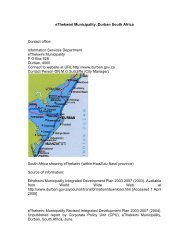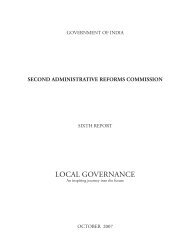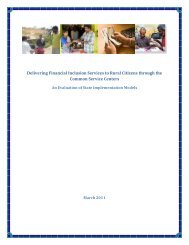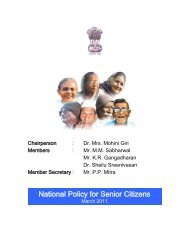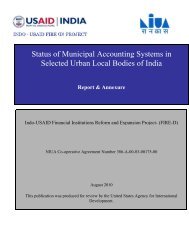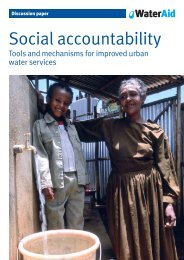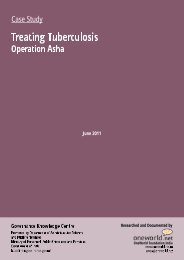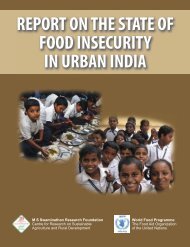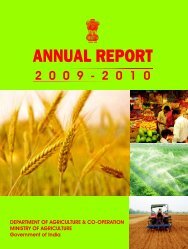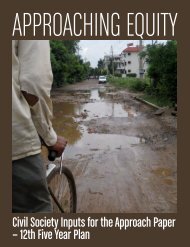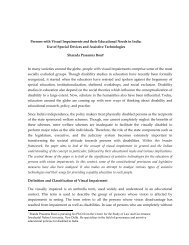Changing Framework of Local Governance and - Create
Changing Framework of Local Governance and - Create
Changing Framework of Local Governance and - Create
You also want an ePaper? Increase the reach of your titles
YUMPU automatically turns print PDFs into web optimized ePapers that Google loves.
<strong>Changing</strong> <strong>Framework</strong> <strong>of</strong> <strong>Local</strong> <strong>Governance</strong> <strong>and</strong> Community Participation in Elementary Education(i) The Gramsabha 6 (village council) will run the adult education programme in the village. Itis interesting to note that no mention has been made regarding the role <strong>of</strong> Gramsabha in otheraspects <strong>of</strong> education.(ii) Gram Panchayat (local self-governing body at the village level) will provide educationthrough primary <strong>and</strong> middle schools, create awareness among the people <strong>and</strong> ensure enrolment<strong>of</strong> all the children in the primary school, construction <strong>and</strong> maintenance <strong>of</strong> hostels etc.(iii) Panchayat Samitis (block level bodies) are expected to perform a variety <strong>of</strong> functionsparticularly with respect to elementary education. These include the promotion <strong>of</strong> primary <strong>and</strong>secondary education, the construction <strong>and</strong> maintenance <strong>of</strong> school buildings, <strong>and</strong> the provision<strong>of</strong> education for working children.(iv) Roles identified for Zilla Parishad (district level body) include the construction <strong>of</strong> roadsto connect all the schools <strong>and</strong> colleges in the district; the construction <strong>and</strong> maintenance <strong>of</strong>primary <strong>and</strong> secondary schools; the construction <strong>and</strong> maintenance <strong>of</strong> hostels, ashram shalas(residential schools), etc.; the provision <strong>of</strong> scholarship / maintenance grants; the construction<strong>of</strong> schools <strong>and</strong> hostels for Scheduled Caste, Scheduled Tribe <strong>and</strong> Other Backward Castestudents; <strong>and</strong> the provision <strong>of</strong> free textbooks <strong>and</strong> teaching <strong>and</strong> learning materials for thesegroups. It is also specified that permanent committees <strong>of</strong> the Zilla Parishad could beconstituted for different sectoral areas, with one such committee, the Education <strong>and</strong> HealthCommittee, which would look after all the functions related to education.As the policies have changed, the rationale for decentralisation has also undergone asignificant change. The National Policy on Education 1986 <strong>and</strong> the accompanying Programme<strong>of</strong> Action called for an integrated <strong>and</strong> decentralized approach to developing school educationsystems with a focus on building the capacity <strong>of</strong> districts in planning <strong>and</strong> management <strong>of</strong>school education, particularly at the elementary level. Decentralization was envisaged as afundamental requirement for improving the entire education system <strong>and</strong> for creating anappropriate framework for accountability at each level <strong>of</strong> administration. Reviewing thesituation towards the end <strong>of</strong> 1980s, Ghosh, (1989) listed several arguments in favour <strong>of</strong> themove for decentralization. These included:(a) The needs <strong>and</strong> priorities <strong>of</strong> different areas are best determined by local assemblies <strong>of</strong>persons rather than by outside experts (though the latter may be able to pr<strong>of</strong>fer technicallybetter drawn up schemes to meet those needs).(b) With growth in political consciousness, as well as the emergence <strong>of</strong> diverse 'action groups'(including NGOs) to assist <strong>and</strong> organize poor people, the politicization <strong>of</strong> the masses can bespeeded up by the process <strong>of</strong> decentralization <strong>of</strong> power <strong>and</strong> authority.(c) People may be trusted to know their best interests <strong>and</strong> to fight for the same especiallywhere purely local matters are involved.(d) Decentralization would allow the different socio-cultural groups in India to plan for theirown welfare <strong>and</strong> growth in line with their cultural traditions, background, aptitudes, resources<strong>and</strong> aspirations. India is a country <strong>of</strong> people with diverse cultural identities, which must berecognized as a matter <strong>of</strong> priority <strong>and</strong> can be possible by promoting decentralization.6 Gramsabha is conceived as the general council <strong>of</strong> all villagers.6




